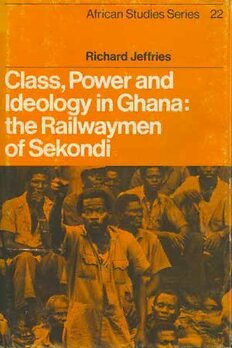
Class, Power and Ideology in Ghana: The Railwaymen of Sekondi (African Studies) PDF
256 Pages·1978·6.442 MB·English
Most books are stored in the elastic cloud where traffic is expensive. For this reason, we have a limit on daily download.
Preview Class, Power and Ideology in Ghana: The Railwaymen of Sekondi (African Studies)
Description:
Although there is a growing body of literature on the process and potential political consequences of class-formation in Africa, there are virtually no detailed studies of the political attitudes and behaviour of African industrial workers. First published in 1978, this study analyses the political history and sociology of one particular group - the railway workers of Ghana's third city, Sekondi-Takoradi, who are renowned for their leading role in the Ghanaian nationalist movement and for their sustained opposition to the elitism and authoritarianism of post-Independence governments. In seeking to explain the ideological consistency which has informed the political activities of the railway workers, Richard Jeffries shows how, within a close-knit and relatively stable community, a keen sense of their own history has provided the basis for a shared political culture.
See more
The list of books you might like
Most books are stored in the elastic cloud where traffic is expensive. For this reason, we have a limit on daily download.
